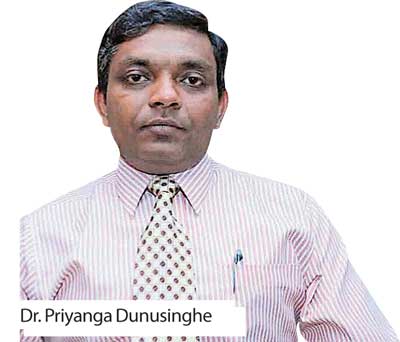Reply To:
Name - Reply Comment
Last Updated : 2024-04-26 13:26:00
 Although the policy makers think indirect taxes such as Value Added Tax (VAT) is an easier and a much quicker way of filling the government coffers whenever it goes dry, it does not always happen that way because the people increasingly spend their incomes abroad, according to an economist.
Although the policy makers think indirect taxes such as Value Added Tax (VAT) is an easier and a much quicker way of filling the government coffers whenever it goes dry, it does not always happen that way because the people increasingly spend their incomes abroad, according to an economist.
As pointed out by Dr. Priyanga Dunusinghe, an Economics professor at the Colombo University, VAT is the first thing that comes to mind of the policy makers when they do not have proper records of the people’s income sources, which otherwise could have been used to tax them more justly. He said this is typically the mentality of the policy makers in an under-developed country which is inimical towards the poor because they become poorer as they bear the largest brunt of the tax burden while the rich pay less VAT.
“Many argue that VAT is nice, in the sense that it could collect revenues in a short period, very much easily. This is the line of thinking in an under-developed or less-developed country where there are no proper documentation system in terms of recording and identifying the source of income,” Dr. Dunusinghe told the recently concluded Sri Lanka Economic Association annual sessions.
According to taxation theory, taxing based on a person’s income source is progressive while taxing on goods and services is regressive in nature because the tax burden falls on the poor than the rich.
Sri Lanka’s parliament passed the VAT amendment bill last week after more than a four months delay when the Supreme Court suspended the passage of the bill due to its failure to follow the due constitutional process.
The government expects to collect an additional Rs.100 billion in revenue annually after the new VAT rate of 15 percent comes into play from tomorrow. The passage of the VAT bill was imperative to put the derailed International Monetary Fund (IMF) deal back on track as the programme was in abeyance until the VAT was implemented as it was a key condition in the agreement.
The IMF in September concluding its first post-programme review said VAT would continue to constitute a significant share of tax revenues for the government even in 2017.
Sri Lanka’s direct and indirect tax composition has become highly lopsided since 1977 with the opening of the economy.
The share of direct taxes which accounted for 61 percent of total tax revenue during the pre-1977 era dropped to 30 percent during the 1978-1996 era, while the share of indirect taxes increased up to 70 percent.
The imbalance further deteriorated in 2014 and 2015 when the share of indirect taxes rose to 78 percent from the total tax revenue while the share of direct taxes narrowing to just 22 percent, just 2 percent of the gross domestic product.
Further, the taxes on domestic goods and services increased from an average of 20 percent of tax revenue during 1950-1977 to 44 percent during 1978-1996 while such taxes accounted for as much as 40 percent.
Poor spend greater proportion of their income on food and since food accounts for substantial portion of tax receipts of the government. The implications on poor from VAT is larger than for higher income earners.
“What you just do is that you wait until people come to the market and you charge (VAT) from them because the government finds it difficult to tap the (people’s) income sources.
So, assuming that from wherever and whenever you earn, you have to come to the market to buy, the tax officer sit there and charge the VAT,” said Dr. Dunusinghe explaining the method’s less efficacy because not all people spend their income locally.
“This is ok as long as if we assume people who earn here spend locally. But even the small and mid-sized businessmen really don’t spend their income here because they either go abroad or spend on recreational or educational activities or on medical needs. Those expenditure do not come under taxation (VAT),” he added.
Sri Lanka failed to bring in timely tax reforms which would have increased the government revenue along with the increase in income levels of the population.
As a result Sri Lanka’s tax revenue as a percentage of GDP steadily declined to 11.4 percent in 2014, before rising to 13 percent in 2015 when the share of its South East Asian peers hovers above 20 percent of GDP.

Add comment
Comments will be edited (grammar, spelling and slang) and authorized at the discretion of Daily Mirror online. The website also has the right not to publish selected comments.
Reply To:
Name - Reply Comment
US authorities are currently reviewing the manifest of every cargo aboard MV
On March 26, a couple arriving from Thailand was arrested with 88 live animal
According to villagers from Naula-Moragolla out of 105 families 80 can afford
Is the situation in Sri Lanka so grim that locals harbour hope that they coul